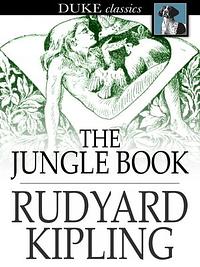You need to sign in or sign up before continuing.
Take a photo of a barcode or cover
The best adaptation is the 1967-1971 Soviet Союзмультфильм "Маугли"—the animation is so good.
The more I think about this book (collection of stories, really), the more uncomfortable I am. It's impossible for me to overlook the blatant misogyny and racism in Kipling's writing, particularly when he anthropomorphises animals to this extent. The monkeys and snakes are inherently evil because Kipling has decided so; the animals exist within a hierarchal society with authoritarian principles reminiscent not of the wild jungle but of late-19th century Britain; the treatment of transgressions is done in an undeniably "human" manner, despite being called "the law of the jungle." Yes, it's a make-believe fantasy story about talking animals, but that doesn't excuse the racism.
Kipling was British, although he spent some time in British-occupied India. This was at the heyday of Social Darwinism, the concept that misinterpreted Charles Darwin's ideas of natural selection and survival of the fittest by applying them to human societies. The idea was that humans had a natural hierarchy, that white men were at the top, and everyone else was somewhere down the ladder. This then bled into the belief that white men, specifically white European men, had a right—nay, a duty—to colonise and "civilise" other races, cultures, countries, and so on. That was the ideology to which Kipling subscribed, and that which he had in mind when deciding the characters of these jungle animals.
Here is an example of Kipling's racist and white supremacist beliefs—an excerpt from a poem he wrote, called "The White Man's Burden," in which he urged the United States to follow in Britain's footsteps and conquer the Philippine Islands:
I only watched the Disney adaptation once, a very long time ago, so I can't speak to its objective quality; however, any adaptation which departs even slightly from the legacy of racism, imperialism, and colonialism entrenched in these short stories is likely to be better than the original.
The more I think about this book (collection of stories, really), the more uncomfortable I am. It's impossible for me to overlook the blatant misogyny and racism in Kipling's writing, particularly when he anthropomorphises animals to this extent. The monkeys and snakes are inherently evil because Kipling has decided so; the animals exist within a hierarchal society with authoritarian principles reminiscent not of the wild jungle but of late-19th century Britain; the treatment of transgressions is done in an undeniably "human" manner, despite being called "the law of the jungle." Yes, it's a make-believe fantasy story about talking animals, but that doesn't excuse the racism.
Kipling was British, although he spent some time in British-occupied India. This was at the heyday of Social Darwinism, the concept that misinterpreted Charles Darwin's ideas of natural selection and survival of the fittest by applying them to human societies. The idea was that humans had a natural hierarchy, that white men were at the top, and everyone else was somewhere down the ladder. This then bled into the belief that white men, specifically white European men, had a right—nay, a duty—to colonise and "civilise" other races, cultures, countries, and so on. That was the ideology to which Kipling subscribed, and that which he had in mind when deciding the characters of these jungle animals.
Here is an example of Kipling's racist and white supremacist beliefs—an excerpt from a poem he wrote, called "The White Man's Burden," in which he urged the United States to follow in Britain's footsteps and conquer the Philippine Islands:
Take up the White Man’s burden—This poem was written in the aftermath of the Berlin Conference which led to the "Scramble for Africa," which refers to the invasion, colonisation, and occupation of African states by different European powers. In this poem Kipling explicitly urges the United States to extend its colonialism and imperialism, following in the footsteps of Western Europe.
Send forth the best ye breed—
Go send your sons to exile
To serve your captives' need
To wait in heavy harness
On fluttered folk and wild—
Your new-caught, sullen peoples,
Half devil and half child.
I only watched the Disney adaptation once, a very long time ago, so I can't speak to its objective quality; however, any adaptation which departs even slightly from the legacy of racism, imperialism, and colonialism entrenched in these short stories is likely to be better than the original.
adventurous
lighthearted
medium-paced
Plot or Character Driven:
A mix
Strong character development:
Yes
Loveable characters:
Complicated
Diverse cast of characters:
Yes
Flaws of characters a main focus:
Yes
Die Kolonialismusdebatte um die Dschungelbücher und Kipling schob sich manchmal beim Lesen wie ein unschöner Schatten vor die einzigartige, brutale, faszinierende erzählte Welt und ließ mich unbehaglich und mit der Frage, welche Agenda hinter bestimmten Passagen steckt, zurück. Besonders bei den Geschichten um und über Mowgli. Er, der Mensch, ist von Natur aus den anderen Dschungelbewohnern überlegen, inhärent durch sein Menschsein. Sobald er erwachsen, mündig ist, ist er natürlicherweise der Gebieter des Dschungels, dem sich alle unterwerfen. Wer seine Herrschaft nicht anerkennt, muss sterben. Widerspruchslos nehmen die Übrigen ihren Platz zu seinen Füßen ein.
Sicherlich ist es zu einfach die Kolonialherren mit Mowgli gleichzusetzen. Auch wird man dem schriftstellerischen Können Kiplings so nicht gerecht. Ein Nachdenken über Herrschaft, Kultur vs. Natur und nicht zuletzt den Platz der Menschen unter anderen, nichtmenschlichen* Tieren regt die Lektüre allemal an.
Obwohl ich mich mit der zugrundeliegenden Denkweise und Weltsicht nicht anfreunden kann und möchte, wertschätze ich diese Erzählungen enorm. Besonders: The White Seal, Rikki-Tikki-Tavi, Quiquern.
*vgl. Vogel, Mikael: Tier. Verlagshaus Berlin, 2020.
Sicherlich ist es zu einfach die Kolonialherren mit Mowgli gleichzusetzen. Auch wird man dem schriftstellerischen Können Kiplings so nicht gerecht. Ein Nachdenken über Herrschaft, Kultur vs. Natur und nicht zuletzt den Platz der Menschen unter anderen, nichtmenschlichen* Tieren regt die Lektüre allemal an.
Obwohl ich mich mit der zugrundeliegenden Denkweise und Weltsicht nicht anfreunden kann und möchte, wertschätze ich diese Erzählungen enorm. Besonders: The White Seal, Rikki-Tikki-Tavi, Quiquern.
*vgl. Vogel, Mikael: Tier. Verlagshaus Berlin, 2020.
Mowgli, and Rikki-Tikki-Tavi are better than the rest, and some are not that grande. But, they are original.
I loved this. Book Mowgli is much tougher and forward thinking than Disney's Mowgli... They did Kaa sooooo dirty in the Disney adaptation too!
I liked the White Seal story and Rikki Tikki Tavi, but not so much Toomai of the Elephants and Her Majesty's Servants.
I would still recommend everyone to give this a go!
I liked the White Seal story and Rikki Tikki Tavi, but not so much Toomai of the Elephants and Her Majesty's Servants.
I would still recommend everyone to give this a go!
adventurous
slow-paced
Plot or Character Driven:
Character
Strong character development:
No
Loveable characters:
No
Diverse cast of characters:
Yes
Flaws of characters a main focus:
No
It is difficult to peer through the miasma that modern-day media creates for old literature.
The Jungle Book is a beloved Disney film, featuring the magical aura that Disney always manages to create for their movies. This, I believe, is the only reason that there is any love out there for this book, the nostalgia that surrounds the movie and the book upon which it is based.
There is a poem that Rudyard Kipling, the author of this book, has written. It is called The White Man's Burden. This is an excerpt.
"Take up the White Man’s burden—
Send forth the best ye breed—
Go send your sons to exile
To serve your captives' need
To wait in heavy harness
On fluttered folk and wild—
Your new-caught, sullen peoples,
Half devil and half child."
Some historical context: Kipling was a British man, though he was raised up in India during Great Britain's occupation of India. Great Britain, at the time, had developed a term which they believed applied to their status in the world. This term was "Social Darwinism." Social Darwinism adopted Charles Darwin's concepts of survival of the fittest and natural selection and applied them to humanity. Within this application, Social Darwinism claimed that there was a natural hierarchy to the human race, that the white man was on top and had the god-given right to the domination of other lands. Thus, it was also claimed that they then had an obligation to "civilize" black men and women, or any race that was not white.
There was a purpose, too, to this poem. At this time in history, the United states had not yet attempted to "civilize" or otherwise dominate any land aside from that of North America, while most all of Europe had. There had been a gathering of quite a few European states called the Berlin Conference, at which there was a drawing up of rules that these states made for themselves (what qualified as occupation, there were no slaves allowed, though forced labor was acceptable, what states need to do to maintain their occupation) in order to "fairly" divvy up the entirety of the lands in Africa.
This lead to something called "The Scramble for Africa," in which the invasion, occupation, division, and colonization of African territory by European powers took place.
This poem was an effort to encourage America to do the same, even at one time calling the country out as a coward. And, of course, America responded by taking the Philippines, Hawaii, Guam, Puerto Rico, and the temporary occupation of Cuba (though the US later kept Guantanamo Bay).
The Jungle Book is a beloved Disney film, featuring the magical aura that Disney always manages to create for their movies. This, I believe, is the only reason that there is any love out there for this book, the nostalgia that surrounds the movie and the book upon which it is based.
There is a poem that Rudyard Kipling, the author of this book, has written. It is called The White Man's Burden. This is an excerpt.
"Take up the White Man’s burden—
Send forth the best ye breed—
Go send your sons to exile
To serve your captives' need
To wait in heavy harness
On fluttered folk and wild—
Your new-caught, sullen peoples,
Half devil and half child."
Some historical context: Kipling was a British man, though he was raised up in India during Great Britain's occupation of India. Great Britain, at the time, had developed a term which they believed applied to their status in the world. This term was "Social Darwinism." Social Darwinism adopted Charles Darwin's concepts of survival of the fittest and natural selection and applied them to humanity. Within this application, Social Darwinism claimed that there was a natural hierarchy to the human race, that the white man was on top and had the god-given right to the domination of other lands. Thus, it was also claimed that they then had an obligation to "civilize" black men and women, or any race that was not white.
There was a purpose, too, to this poem. At this time in history, the United states had not yet attempted to "civilize" or otherwise dominate any land aside from that of North America, while most all of Europe had. There had been a gathering of quite a few European states called the Berlin Conference, at which there was a drawing up of rules that these states made for themselves (what qualified as occupation, there were no slaves allowed, though forced labor was acceptable, what states need to do to maintain their occupation) in order to "fairly" divvy up the entirety of the lands in Africa.
This lead to something called "The Scramble for Africa," in which the invasion, occupation, division, and colonization of African territory by European powers took place.
This poem was an effort to encourage America to do the same, even at one time calling the country out as a coward. And, of course, America responded by taking the Philippines, Hawaii, Guam, Puerto Rico, and the temporary occupation of Cuba (though the US later kept Guantanamo Bay).
lighthearted
slow-paced
lighthearted
fast-paced
Read this because I own the clothbound classic.
adventurous
emotional
inspiring
lighthearted
sad
medium-paced
Plot or Character Driven:
Plot
Strong character development:
Yes
Loveable characters:
Yes
Diverse cast of characters:
Yes
Flaws of characters a main focus:
No






